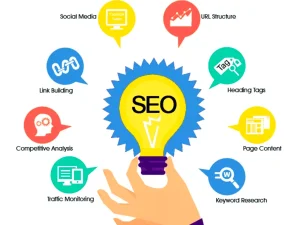In the ever-evolving digital landscape, having a strong online presence is paramount for any website or business. One of the key ingredients to achieving this is understanding and implementing effective Search Engine Optimization (SEO) strategies. When it comes to managing a website, WordPress is a popular and user-friendly platform that allows individuals and businesses to create and maintain their online presence. In this guide, we’ll explore the world of WordPress SEO, breaking down the essentials in an easy-to-understand manner.
What is the Relationship between WordPress and SEO?
WordPress is a versatile content management system that powers most of the internet. Its user-friendly interface makes it accessible to individuals with varying technical expertise. However, having a WordPress site is just the beginning; ensuring it’s optimized for search engines is equally crucial.
What is SEO and Why Does It Matter?
Search Engine Optimization (SEO) involves changing your website to rank higher on search engine results pages (SERPs). The primary goal is to enhance visibility and drive organic (non-paid) traffic to your site. Google and Bing are the two major search engines, and understanding their algorithms is key to a successful SEO strategy.
Key Components of WordPress SEO
1. On-Page SEO
On-page SEO involves optimizing individual pages on your website. This includes focusing on elements such as URL structure, use of keywords in content, and proper utilization of headers and meta tags.
2. Technical SEO
Technical SEO addresses the backend aspects of your website, ensuring that it’s accessible and easily understood by search engines. This includes optimizing website speed and mobile responsiveness and fixing crawl errors.
3. Off-Page SEO
Off-page SEO encompasses activities that take place outside of your website but still impact its ranking. Building quality backlinks from reputable sources and fostering a positive social media presence are examples of off-page SEO.
Tools to Enhance Your WordPress SEO
1. SEO Plugins
WordPress offers a range of SEO plugins to simplify optimization efforts. Popular choices include Yoast SEO, All in One SEO (AIOSEO), and Rank Math. These plugins guide users in optimizing content, meta tags, and more.
2. Google Search Console
An essential tool provided by Google, the Search Console helps monitor and maintain your site’s presence in Google Search results. It provides insights into how Googlebot views your site, identifies issues, and offers suggestions for improvement.
Optimizing Content for SEO
1. URL Structure and WWW vs. Non-WWW
A clean and SEO-friendly URL structure enhances user experience and makes it easier for search engines to understand the content. Additionally, choosing between WWW and non-WWW versions of your domain can impact SEO.
2. Alt Text and Internal Linking
Incorporating descriptive alt text for images and implementing internal linking within your content improves accessibility and helps search engines understand the relevance of your pages.
Building Authority with Backlinks
Backlinks are links from other websites to yours. Dofollow links pass authority, while nofollow links indicate to search engines that the linked-to website shouldn’t be endorsed. A well-rounded link-building strategy is crucial for SEO success.
Social Media Influence and Its Impact on SEO
While social media signals may not directly impact search engine rankings, a strong social media presence can indirectly contribute to SEO success. Engaging content on platforms like Facebook, Twitter, and Instagram can drive traffic and boost brand visibility.
Keyword Research for Effective SEO
Tools like Ahrefs can help identify relevant keywords for your content. Understanding user intent and incorporating long-tail keywords into your content strategy improves the likelihood of ranking for specific search queries.
For further insights on the evolution of SEO companies and their adaptability and innovation, check out Evolution of SEO Company.
Technical Considerations for SEO Success
1. SSL Certificates and HTTPS
Google considers HTTPS a ranking signal, and an SSL certificate ensures a secure connection between the user’s browser and your website.
2. Semantic Search Optimization and Structured Data
As search engines evolve, they increasingly rely on semantic understanding. Implementing structured data markup helps search engines better comprehend the content on your pages.
Ensuring Site Usability and Performance
Factors such as page load speed, responsive design, and overall site navigation contribute to user satisfaction and SEO. Google considers these aspects when determining rankings.
The Human Element: Content Quality and User Engagement
No amount of technical optimization can replace high-quality, engaging content. Understanding your target audience, conducting competitor analysis, and incorporating compelling calls-to-action (CTAs) are crucial for user engagement and conversion rates.
Conclusion
In conclusion, WordPress SEO is a dynamic and multifaceted endeavor requiring technical expertise, content strategy, and user-centric design. Adapting to the evolving landscape, staying informed about algorithm changes, and implementing best practices will help ensure your WordPress website ranks well and provides a valuable experience for your audience.
If you’re specifically interested in SEO services in Dublin, visit SEO Dublin or explore comprehensive website design solutions at Website Design Dublin.




























































































































